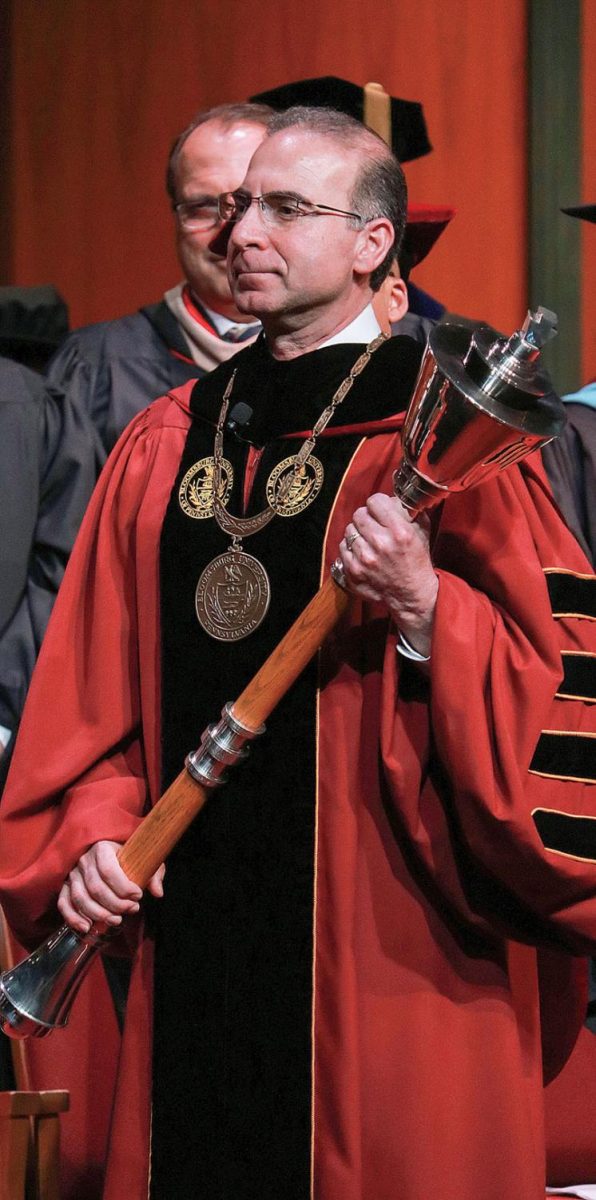When Vampire Weekend surfaced in 2006 with their preppy, upbeat modernistic blend of sophisticated guitar notes and elegant African pop sounds, the few people who knew of the up-and-coming band knew that what they were witnessing and listening to was truly something special. Now, in 2018, Vampire Weekend is a worldwide name, with numerous albums such as their freshman album, simply titled “Vampire Weekend,” their second album “Contra” and their newest album “Modern Vampires of the City.”
Ezra Koenig, Chris Baio, Chris Tomson and former member Rostam Batmanglij (who has recently had an outstanding solo debut) took cultural differences and standards and highlighted their outrageous oddities and expectations to create an indie band that not only defies the genre itself, but the social expectations of the members as well as society.
Meeting at Columbia University, the members of Vampire Weekend swore one day to start a band, and the two founders—Ezra Koenig (lead guitarist and vocalist) and Chris Tomson (drummer) set out to do just that.
In 2006, in their final years at Columbia University, Vampire Weekend, with new members Chris Baio and Rostam Batmanglij, played small shows within the campus, gaining a small following among the students and staff alike. Later that year, after the members were fresh out of college and money alike, produced their first album “Vampire Weekend” shortly after receiving their diplomas and working full time jobs.
Vocalist and lead guitarist Ezra Koenig’s story is the most inspiring. Graduating with an English degree, Koenig began teaching in the poorer parts of New York as a middle school English teacher through Teach for America.
Koenig landed a job in a low-income school where his own preppy style was not popular with his students. Koenig has stories where students would throw things at him, put thumb tacks on his seat and call him names—all because of what he looked like and how he dressed.
This is what Vampire Weekend is truly about. When people see and hear Vampire Weekend for the first time, many of those people will immediately few them as snobby, rich and arrogant. And why wouldn’t they? The members all dress in button downs and cardigan sweaters with perfectly combed hair and confident postures. But this is exactly what Ezra Koenig wants people to think.
Yes, the members of Vampire Weekend attended Columbia University, yes, they dress in preppy attire, yes, they have a song called “Oxford Comma,” but all the members came from middle-class families and were just like every other average young adult in the world—in debt and looking for a place in this world while fighting off cultural and societal standards.
In an interview with Rolling Stone, Koenig stated, “My family never had a lot of money. It’s weird to think that I grew up so much better off than my grandparents, or even my parents, but still occasionally feel like a country bumpkin.” Those who look from the outside in at Vampire Weekend without doing research find themselves scoffing at the band’s preppy, Ivy League appeal, but as Koenig stated, this is certainly not the case.
Songs such as “Cape Cod Kwassa Kwassa” and “Step” highlight the social class stereotypes within normal society, and Vampire Weekend takes this a step further by portraying the immense divide in social classes by the way they dress. The songs that Vampire Weekend sings, their education and style combine to make them seem like a “better-than-thou” group of individuals. But the truth is, the members all had to work to where they are now.
The song “Cape Cod Kwassa Kwassa” seems like a bunch of odd gibberish for a song title, and the song itself is open-ended and full of metaphors, but the message within the song is clearer than the beautiful beachy day that the girl in the song is experiencing.
The girl, who is not named in the song, but seems to be the focus, is an upper-class girl with a passion for “poor” urban music. The lyrics, “As a young girl, Louis Vuitton. As a sophomore, with reggaetón. And the linens you’re sitting on” highlight the meaning of the song—no matter what someone’s background is, rich or poor, black or white, that person can be as different or as normal as they want in society.
To Koenig, social status does not indicate a person’s importance or worth. Koenig views people as being capable of understanding one another, and that is what he portrays in Vampire Weekend’s music.
Koenig may sing those lyrics with a smile on his face and a Ralph Lauren polo on, but that smile isn’t solely from being in a successful indie band, but because he is able to create a metaphorical façade that resonates with those who are able to put aside societal standards in order to view one another as people of the same creation, rather than different people of differing social classes.
Sabin is a freshmen English major. He is an assistant Opinions Editor.
















